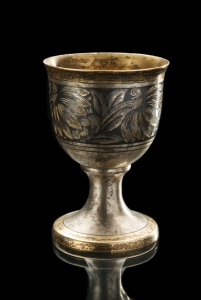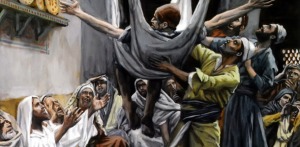One day, as Jesus was teaching the people in the temple and preaching the gospel, the chief priests and the scribes with the elders came up and said to him, “Tell us, by what authority you do these things, or who it is that gave you this authority.” Luke 20:1-2
He has established himself in the same courtyard—as if he owned the place! they keep thinking. The crowds are thronging, the news is spreading, and alarm among the elites casts a pall over what was meant to be another orderly, peaceful Passover. The chief priests, whose family lineage goes back to Aaron, the elders whose claim to authority even the Romans defer to, and finally the scribes and their Pharisee allies, who often clash with the priestly crowd, all meet to talk it over.
This disturbance, they all agree, has its roots in John the Baptist, who kept shouting about a new age until his ministry abruptly ended at the edge of a broadsword. John’s death was a relief—one thing they could think that idiot Herod for—until the rumors of Jesus of Nazareth began circulating and swelling and all but shrieking at them. Even at that, Jesus might have been manageable if he’d stayed in Galilee, but his appearance in Jerusalem is the worst kind of omen.
(Oh Jerusalem . . . if you only knew what makes for peace.)
Pharisees from those northern regions (those tiresome hicks, with their nattering about the Law and its proper observance) have brought troubling but useful reports about his weird claims and cheeky challenges to the old order. Also rumors of signs and wonders, which can’t be confirmed even though they persist. Now that he’s in the city he, doesn’t seem to be healing people (or pretending to), but his teaching is an even greater threat. The way he talks, about my kingdom, my house, my Father—who does he think he is?
(How often would I have gathered you, as a hen gathers her chicks, but you would not . . . the more I called you, the more you ran away from me.)
There is no help for it. For all kinds of reasons–political, social, religious–he must be destroyed. And not in some back-alley garroting, but out in public. First, though, it’s imperative to undermine his moral authority. How much moral authority can a backwater preacher from Galilee have, anyway?
That afternoon, as the Nazarene is teaching in the courtyard, here they come: elders, priestly representatives,  scholarly scribes and Pharisees in their robes and tassels, marching across the tiles with the rocked-ribbed confidence of a Roman phalanx. “Tell us,” say the eldest of the elders, whose name is Johannes, “by whose authority did you clear this place and take up this false teaching?”
scholarly scribes and Pharisees in their robes and tassels, marching across the tiles with the rocked-ribbed confidence of a Roman phalanx. “Tell us,” say the eldest of the elders, whose name is Johannes, “by whose authority did you clear this place and take up this false teaching?”
The teacher doesn’t appear to be alarmed or taken aback. He doesn’t even take time to consider the ramifications of the question. “First, let me ask you something. Remember John’s baptism, which people were pouring out of this city to receive? Was it by the authority of heaven, or of a mere man?”
The elder opens his mouth to reply before recognizing the trap. “One moment.” With a jerk of his head, he draws the others aside.
“Where did that come from?” a Pharisee wonders. “How strange—we were just talking about John!”
“Never mind where he got it,” Johannes snaps. “He probably has his spies everywhere. What is our answer?”
“The teaching was from men, of course,” one of the scribes whispers. “John was a lunatic.”
“That’s not what the people think,” hisses Johannes. “They still believe John was a holy man and a prophet.”
Eliphaz nods. “Proclaim to the mob that John was mad and they’ll tear us to pieces. No thanks.”
Maimonides, another elder, throws up his hands. “Very well, then! Tell him it was from heaven.”
“And what will he say then?” Johannes glares at each one of them in turn. “That we should have listened to John! Should have tossed dust on our heads and put on sackcloth and paraded down to the Jordan for that madman to baptize us.” A seething pause follows, in which they realize they’ve been outmaneuvered. “We’ll get him next time.” Turning back to the teacher, Johannes announces, “We can’t say for sure where John—that holy man of lamented memory—got his authority.”
“You can’t?” their adversary repeats. “Then I needn’t tell you where my authority comes from.” He nods in dismissal. “Priests, elders, scribes—until we meet again.”
His disciples and all hearers are delighted to see the snobs put down. But his closest friends hear a disturbing echo: priests, elders, scribes . . . they have not seen the last of these.
______________________________________________
For the original post in this series, go here.
Next>


